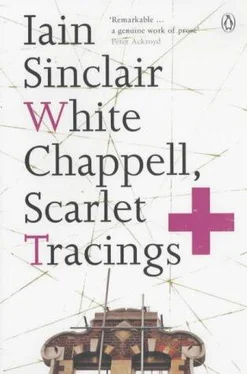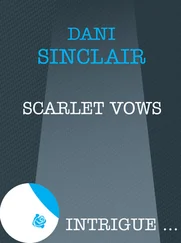‘The whole scenario, like a Rosicrucian Manifesto, is there in his Illuminations . I won’t even try to sound it in French. But in aborted English, the elements… a few fragments… shave it down… terrifying…
*
“ I responded by snickering at this satanic doctor ,
& finished by getting to the window —
Phantoms of future nocturnal luxury
*
We would wander, nourished by the wine of caves &
the biscuit of the road, hard pressed
to find the place & the formula
By the grouping of buildings, in squares ,
courtyards & enclosed terraces ,
they have ousted the coachman
*
On the slope of the bank, angels fashion their robes
of wool in pastures of steel & emerald…
meadows of flame… on the left the compost of the ridge
is stamped down by all the murderers… all
the disastrous clamours spin their curve
The pivoting of rotting roofs
*
I stepped down into this carriage where period
is adequately indicated by the convex windows ,
Bulging panels & contoured seats
The vehicle turns on the grass of an obliterated highway:
& in a blemish at the top of the window on the right
swirl pale lunar figures, leaves, breasts
Unharnessing near a spot of gravel
*
Here will one whistle for the tempest & the sodoms
*
The accidents of scientific magic
The luminous skulls upon pea seedlings
*
The banner of bleeding meat
The moment of the sweating room ”
‘Heat is prophecy.
‘“Satanic Doctor, window, place. Courtyards, ousted coachman. Left and right. The vehicle, the obliterated highway. Banner of bleeding meat. Moment of the sweating room.”
‘Take this malarial possession and drive it to Africa. Burn it in the furnace like a rotten bandage. Hack it off. Chatterton’s Africa, the Eclogues, the imaginary salvation. Tame the river. It’s always too late.’
For a moment, of necessity, it died. We swallowed, licked around the rim of our glasses. Then Joblard took it up.
‘In Canterbury today, teaching, I heard the fag-end of a lecture on Van Gogh’s time in London. Some highly-scented bitch from the Courtauld Institute.
‘Early 1870s he was here, with a dealer, then teaching, and with some mad job between clergyman and missionary. He had to walk about the East End, where I don’t know, she wouldn’t give you anything specific. Collecting school fees. He also preached a series of sermons. I can see him in the open-air pulpit at Mary Matfellon, spittling the winos, haranguing the derelicts of the future.
‘They only had one slide to show from this period. It was a sketch he made of a horse-drawn coach, travelling to the left, a swirl of shading in the ground, containing names and signatures; couldn’t decipher them. The coach is empty.
‘I flashed to another, hired, carriage, much later, 1889, driven from the asylum on a farewell visit to a girl in the brothel at Arles, one summer afternoon.’
We pocket a bottle of Armagnac; there is a promise of whisky also — at the studio. The three of us, whistling, through the silent warren to Pear Tree Court.
Joblard’s genius is partly expressed in his ability to manipulate the surface of the material world so that, despite all the odds, and while all his peers are going under, he is always supplied with a space in which to work. Dines well, cigars, holidays in villas. Some kind of improbable shape-shifting knack, slipping through periods and disguises, dressed for the abattoir or the tea-dance. Now with a white linen jacket. The castoffs of nautical novelists, backwoods tree-carvers, Blue Mink percussionists all fit, as a second skin. He can borrow from Wellesian gourmets or midgets; the garment, once transferred, is immediately his. Nothing looks new, nothing is decayed.
He unlocks the door. A long room under the now pressing sky; a skylight, star-tile in the roof peak. It is another of Joblard’s secrets. Like Sickert, he had his bolt-holes. The work, the thing made, was the only reality.
Was that a tenable claim? Not altogether. But as a claim, it stood.
Jack found a chair, his feet upon a roll of opaque plastic sheeting, unplugs the brandy.
Joblard’s work is scattered: a pouring of lead; an anvil that might be for use, or might be the work itself; long bow or harpoon on the floor. Elements that could connect, or could be abandoned, broken down, turned into other machines. Bones become lines. Faults run into veins. There are many drawings, star maps, x-rays. A theatre of transformation: surgical rather than gestural.
The generosity of manner ends at the door. Joblard hangs his jacket over a propane cylinder, rolls up his sleeves. If he talks about the work it is in immediate and practical terms. But there is no flannel about craft or technique. He hits you with the basic counters: flayed skin, steel sheet, folding ; rib, joint, poured ; parchment, paper, salt. As we look at the objects — he does not speak of them, but of some other thing, some thing they might become, or might once have been. His face reflects the potential light of the act implied in the object. Harm is here; is contained. The object is its own defence.
This is the richest moment.
When the total assembly is made, when the action is fully described and named, then part of what is here now is closed off: there is a waxed seal.
We light our sumatras from the gas gun, which is then hooked over a tripod, giving a pale cave light. The mad shadows deform us. We are spread back. The bottle standing on the floor between us.
‘I want to remake what has never been made before,’ claims Joblard, grinning savage, one chipped tooth, breakfasting on the thunder stone. It is a night of extravagance, linked by the blue fire tongue, the triangle of utter calm.
‘The ghosts are more tangible than the human presences, the animated clay dolls. I want to re-enter the familiar and discover its dangers. I will name nothing.’
Jack, the long man, sniffs, something over-ripe, hair standing in clumps, disguised presence, allergic to pretension, breaks in; not interrupting, continuing, taking up the torch, putting his hand to the flame. His tale.
‘One January I was working as a decorator in the flat of a Steiner disciple, flower painter, at 16 Chepstow Place, Westbourne Grove. All day off the ground, scratching flakes of ancient paint from the ceiling, eyes sore, dry throat. Handless man. She’s out most of the time, getting ready, leaving for Australia, a man.
‘Comes back late in the afternoon, cup of herbal tea, says, “Oh, by the way, did you know this was the room of the Suicide Club, the actual address?”
‘It was already a strange time for me. I only took the job to get at her piano. Downstairs was a Radio Times theatrical, Beckett man, his wife, nervous in dark glasses. Dusty glamour of obscure fame. Claims she is writing “metaphysical detective stories”. But their main occupation is table-tennis, in the back yard, coats, gloves, mufflers; long ritualised bouts.
‘The radio was on all day: a comet crashed into the hills behind the cottage where John Cowper Powys lived. I’d just come back from there, mad trip, sponsored by a ragtrade lunatic who thought he was some kind of zen master: meaning that he could hire and fire a dozen tremblers a day, and do Groucho Marx imitations on the telephone. He shipped me to the slate quarries in a red Ferrari to turn A Glastonbury Romance into a three-act opera. When I got back — my job was gone and I was done for stealing the car. Shocked into enlightenment!
Читать дальше












